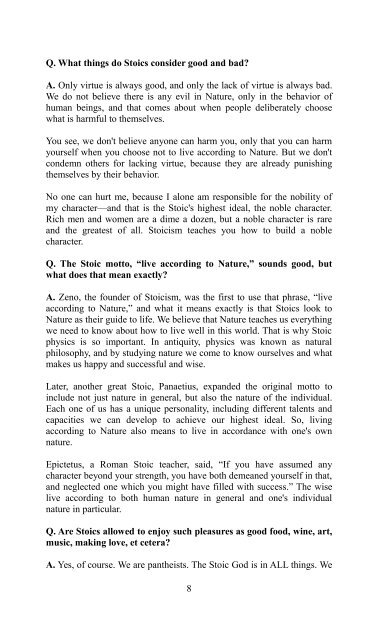The Stoic HANDBOOK - College of Stoic Philosophers
The Stoic HANDBOOK - College of Stoic Philosophers
The Stoic HANDBOOK - College of Stoic Philosophers
You also want an ePaper? Increase the reach of your titles
YUMPU automatically turns print PDFs into web optimized ePapers that Google loves.
Q. What things do <strong>Stoic</strong>s consider good and bad?<br />
A. Only virtue is always good, and only the lack <strong>of</strong> virtue is always bad.<br />
We do not believe there is any evil in Nature, only in the behavior <strong>of</strong><br />
human beings, and that comes about when people deliberately choose<br />
what is harmful to themselves.<br />
You see, we don't believe anyone can harm you, only that you can harm<br />
yourself when you choose not to live according to Nature. But we don't<br />
condemn others for lacking virtue, because they are already punishing<br />
themselves by their behavior.<br />
No one can hurt me, because I alone am responsible for the nobility <strong>of</strong><br />
my character—and that is the <strong>Stoic</strong>'s highest ideal, the noble character.<br />
Rich men and women are a dime a dozen, but a noble character is rare<br />
and the greatest <strong>of</strong> all. <strong>Stoic</strong>ism teaches you how to build a noble<br />
character.<br />
Q. <strong>The</strong> <strong>Stoic</strong> motto, “live according to Nature,” sounds good, but<br />
what does that mean exactly?<br />
A. Zeno, the founder <strong>of</strong> <strong>Stoic</strong>ism, was the first to use that phrase, “live<br />
according to Nature,” and what it means exactly is that <strong>Stoic</strong>s look to<br />
Nature as their guide to life. We believe that Nature teaches us everything<br />
we need to know about how to live well in this world. That is why <strong>Stoic</strong><br />
physics is so important. In antiquity, physics was known as natural<br />
philosophy, and by studying nature we come to know ourselves and what<br />
makes us happy and successful and wise.<br />
Later, another great <strong>Stoic</strong>, Panaetius, expanded the original motto to<br />
include not just nature in general, but also the nature <strong>of</strong> the individual.<br />
Each one <strong>of</strong> us has a unique personality, including different talents and<br />
capacities we can develop to achieve our highest ideal. So, living<br />
according to Nature also means to live in accordance with one's own<br />
nature.<br />
Epictetus, a Roman <strong>Stoic</strong> teacher, said, “If you have assumed any<br />
character beyond your strength, you have both demeaned yourself in that,<br />
and neglected one which you might have filled with success.” <strong>The</strong> wise<br />
live according to both human nature in general and one's individual<br />
nature in particular.<br />
Q. Are <strong>Stoic</strong>s allowed to enjoy such pleasures as good food, wine, art,<br />
music, making love, et cetera?<br />
A. Yes, <strong>of</strong> course. We are pantheists. <strong>The</strong> <strong>Stoic</strong> God is in ALL things. We<br />
8

















